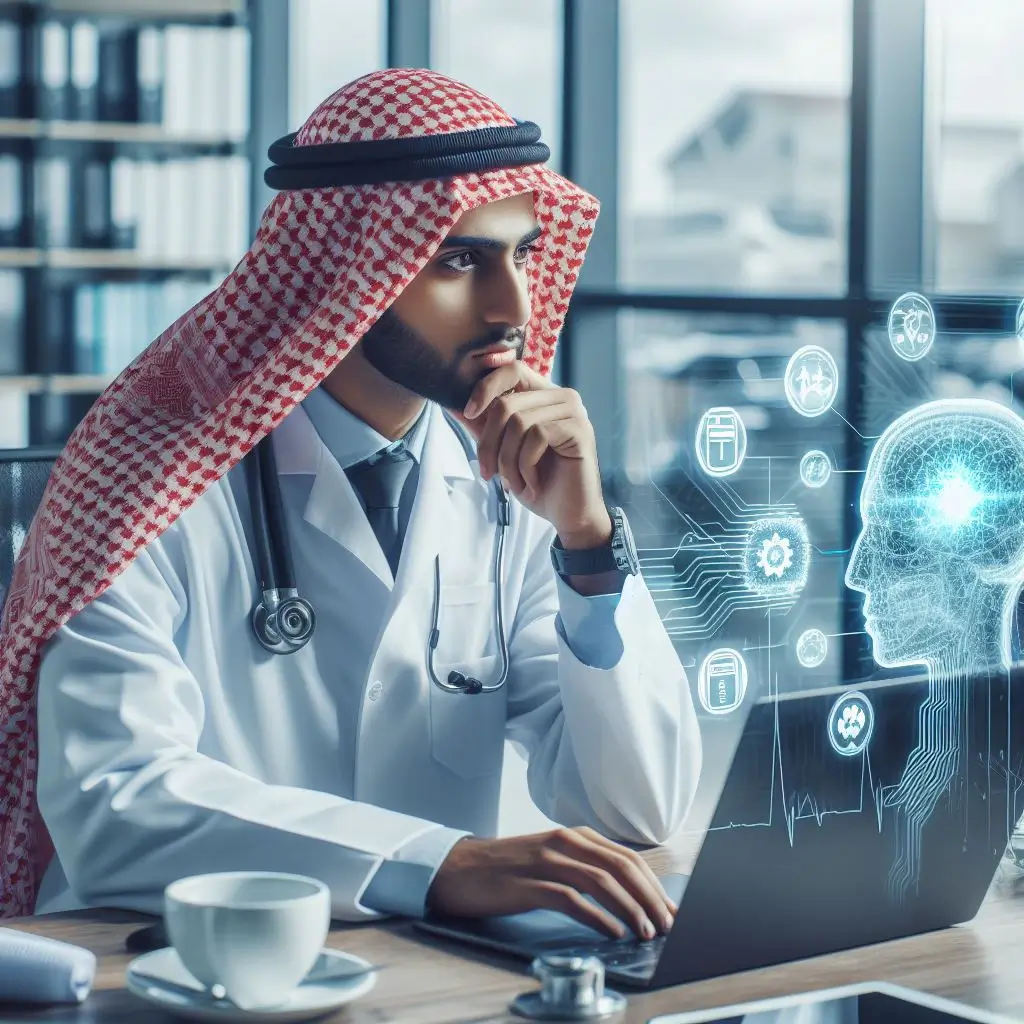Introduction
Artificial intelligence (AI) is no longer the future; it’s the present, especially in the United Arab Emirates (UAE’s) healthcare sector. The UAE government has prioritised the use of AI in all economic sectors, and healthcare is leading the way. AI is making major progress in the health sector, with applications ranging from the improvement of diagnosis, treatment, and prognosis to the monitoring and engagement of patients. In addition to this, it transformed areas such as the manufacturing of pharmaceuticals, research into of new treatments, precision medicine, targeted population health programs, and access to medical care.
AI is becoming an increasingly important component in the healthcare industry, serving as a supplementary technology for healthcare regulators, providers, insurers, and practitioners throughout the industry. Its uses include boosting data analysis and decision-making, improving the accuracy of diagnosis and prognosis, and facilitating research and development in precision medicine. These are only some of the applications that it makes achievable. With regard to Abu Dhabi, the Department of Health (DoH) recognises the enormous potential that AI possesses in the field of healthcare and is actively encouraging its development and application. At the same time, the DoH is working on regulatory solutions to oversee the use of AI in healthcare, with the goal of the patient’s safety. This Insights Article will investigate the remarkable effect that AI has had on the delivery of healthcare services, with a specific emphasis on the initiatives and strategies that Abu Dhabi has implemented.
DoH and Microsoft Team Up to Propel AI in Healthcare
A Cooperative Effort on Using Artificial Intelligence in Healthcare
A commitment has been made by both Abu Dhabi DoH and Microsoft to enhance generative AI in the field of healthcare. This news, which was made during GITEX Global Week 2023, is going to have a significant impact on the way healthcare is practiced in Abu Dhabi. The alliance will investigate the application of AI in healthcare, with the objectives of boosting patient outcomes, boosting efficiency, and improving health research and service delivery.
A Collaborative Effort Towards a More Sound Future
In order to improve coordination and communication, a collaborative working group is going to be developed. The group will explore the development and deployment of AI technology, share successful practices, and identify potential obstacles. In order to advance the capacities of the DoH, better the experiences of patients and clinicians, and elevate the outcomes of both sectors, the objective is to establish a long-term collaboration for the application of AI solutions.
The cooperation will also look into the introduction of an employee experience platform at the DoH to gather real-time insights for smarter working, increased performance, and a better workplace culture. This cooperation opens up a slew of prospects for cross-industry learning, including healthcare expertise for generative AI technology. This is a crucial step toward incorporating cutting-edge technology into health-care services. This collaboration has immense potential benefits, and it has the ability to establish a new worldwide standard for healthcare quality.

Abu Dhabi Health Department and M42 Join Forces for Precision Medicine Advancement
A Leap towards Personalised Medicine
Abu Dhabi (DoH) and Abu Dhabi Health Data Services (ADHDS), a M42 company, have taken a significant stride towards precision medicine. The partnership will allow doctors to access pharmacogenomic reports (PGx) through Malaffi, the Health Information Exchange (HIE) platform operated by ADHDS. This information will aid physicians in prescribing medication tailored to each patient’s genetic profile, enhancing treatment outcomes, and minimising adverse drug events. AI is a major component in precision medicine, particularly in the analysis and interpretation of complex genomic data. AI algorithms can rapidly analyse vast amounts of genetic information, identifying patterns and correlations. This can expedite the discovery of novel gene-disease associations and potential therapeutic targets
Advantages of Pharmacogenomic Technology
Pharmacogenomics, the study of how genes affect a person’s response to drugs, is a significant component of precision medicine. This technology can help reduce the trial-and-error approach often used in prescribing medications, as it allows physicians to predict who will benefit from a medication, who will not respond at all, and who will experience negative side effects. In turn, this could lead to a more efficient healthcare system with improved patient outcomes, fewer adverse drug reactions, and potential cost savings. The importance of understanding the genetic makeup of a community to predict, prevent, and treat genetic and chronic diseases, contributing to a healthier community. It also highlights the role of data in speeding up the integration of innovative solutions tailored to the unique health needs of Emiratis, thereby strengthening Abu Dhabi’s standing as a hub for healthcare innovation.
Data-Driven Health Improvements in Abu Dhabi
Dr. Rashed Obaid Al Suwaidi, Executive Director of Healthcare Workforce Planning Sector at the DoH, expressed pride in Abu Dhabi’s pioneering role in implementing comprehensive pharmacogenomic reports for its citizens. By understanding the genetic makeup of the community, the DoH aims to better predict, prevent, and treat genetic and chronic diseases, translating their vision of a ‘healthier Abu Dhabi’ into reality. The platform links the entire healthcare sector, encompassing over 2,700 healthcare facilities in the emirate. It equips more than 47,000 clinical users with the ability to access 2 billion unique clinical records.
Abu Dhabi’s Department of Health and M42’s AI-driven Approach
A Strategic Partnership for Enhanced Healthcare
Another collaboration was announced at GITEX Global 2023, with the objective of integrating M42’s Clinical Large Language Model (LLM), Med42, into Abu Dhabi’s healthcare system. The ultimate goal is to significantly improve patient care by the DoH’s commitment to digital transformation within the healthcare sector. The integration of the Clinical LLM will streamline clinical decision-making by acting as an AI assistant for healthcare professionals. Med42 has the potential to completely transform the way healthcare is delivered, from facilitating the creation of individualised treatment plans to accelerating access to information that is pertinent to the situation.
This is an open-access Clinical LLM designed to offer high-quality answers for both concise and extensive medical queries. The model outperforms larger closed models, like ChatGPT 3.5, and achieves a 72% score, in a zero-shot evaluation, on the US Medical Licensing Examination (USMLE) Sample Exam questions.
Improving Patient Care and Streamlining Operations with AI
Dr. Rashed Obaid Al Suwaidi, the Executive Director of the Healthcare Workforce Planning Sector at the DoH, expressed the Department’s dedication to collaborating with strategic partners in healthcare. He noted that through such collaborations, they aim to unlock the potential of groundbreaking solutions like Med42, which will enhance the speed of clinical decision-making and improve patient care.
The partnership will leverage M42’s generative AI capabilities to tackle critical aspects of the healthcare ecosystem, including population health management, process optimisation, and patient care enhancement. The integration will begin with Malaffi, enhancing the user experience through a chat-based interface.
Ashish Koshy, Group Chief Operating Officer at M42, emphasised the transformative impact of AI solutions like Med42. He noted that the partnership with DoH is a significant step towards accelerating the adoption of AI-assisted clinical care and creating greater efficiencies across Abu Dhabi’s healthcare sector.

Abu Dhabi’s Digital Transformation
A Groundbreaking Partnership
In a significant move towards the digital transformation of healthcare, the DoH and Burjeel Holdings, a leading private healthcare service provider, have inked a Memorandum of Understanding (MoU). This partnership, also announced during GITEX Global Week 2023, aims to harness the power of AI to enhance patient care in Emergency Departments (EDs).
Artificial Intelligence: The Future of Healthcare
Utilising AI, the collaboration will optimise resource allocation and operational efficiency in EDs. The end goal is to accomplish this while following to international legal and ethical norms in order to enhance the patient experience and safeguard their safety. This project is in line with the Department’s continued investment in digital healthcare infrastructure, which will ensure that the population receives healthcare services that are both comprehensive and timely.
Regarding the relationship, Dr. Saleh Saif Al Ali, who serves as the Executive Director of the Centre of Emergency Preparedness and Response (CEPAR) at the DoH, shared his thoughts. As he pointed out, this partnership exemplifies the DoH’s dedication to sculpting a future that is driven by AI, innovation, and healthcare technology.
Privacy and Regulations
Under the conditions of privacy and regulations, the cooperation will make it easier to safely share pertinent healthcare data with one another. Through the use of this exchange, the development and implementation of AI-based solutions within EDs will be made possible. Furthermore, the collaboration will make it possible to build a framework for the early detection of technological faults and the prevention of errors through decisions that are driven by data.
Burjeel Holdings’ Corporate Director of Emergency Services Line, Dr. Zuhair AlSharafi, brought attention to the potential of AI to improve the treatment that is provided to emergency patients. As part of his presentation, he emphasised the potential for AI solutions to reduce the amount of time spent waiting in EDs, provide assistance to professionals in recognising critical cases at an earlier stage, and evaluate the necessary medical and pharmacological procedures.
This link indicates that the formation of a data-driven culture within EDs is a significant step forward, which is highlighted by this association. For the purpose of data analytics, the incorporation of AI technologies enables healthcare providers to make decisions that are better informed, optimise clinical pathways, and continuously improve patient care procedures.
Key takeaways
- The DoH in Abu Dhabi, is actively promoting and implementing AI technology in the healthcare sector. They have entered into several partnerships to integrate AI into various aspects of healthcare, including precision medicine, data analysis, and operational efficiency in EDs.
- Healthcare generative AI is being used by the DoH and Microsoft to improve patient outcomes, efficiency, and health research. A working group will study AI technology’s development and use, exchange best practices, and identify challenges.
- AI can help predict, prevent, and treat diseases more effectively, leading to improved health outcomes. The partnership between the DoH and M42 aims to use pharmacogenomic reports to tailor medication to each patient’s genetic profile. This personalised approach to medicine can significantly enhance treatment outcomes and minimise adverse drug events.
- The DoH and Burjeel Holdings signed an MOU to deploy AI to optimise ED resource allocation and efficiency. This seeks to reduce ED waiting times and to assist with early detection of critical cases.
- Increasing Abu Dhabi’s overall health is the ultimate objective of the AI-driven initiatives and partnerships that are being implemented in the healthcare industry. By utilising the capabilities of AI, the DoH intends to enhance the quality of healthcare services, improve the outcomes for patients, and eventually contribute to a healthy population.
Bibliography:
Digital T. News | Department of Health – Abu Dhabi [Internet]. [cited 2023 Nov 27]. Available from: News | Department of Health – Abu Dhabi
Digital T. News | Department of Health – Abu Dhabi [Internet]. [cited 2023 Nov 27]. Available from: News | Department of Health – Abu Dhabi
Digital T. News | Department of Health – Abu Dhabi [Internet]. [cited 2023 Nov 27]. Available from: News | Department of Health – Abu Dhabi
Digital T. News | Department of Health – Abu Dhabi [Internet]. [cited 2023 Nov 27]. Available from: News | Department of Health – Abu Dhabi
Release P. Abu Dhabi and Burjeel Holdings collaborate to leverage latest AI technologies within emergency departments [Internet]. [cited 2023 Nov 27]. Available from: Abu Dhabi and Burjeel Holdings collaborate to leverage latest AI technologies within emergency departments
Cleveland Clinic Abu Dhabi [Internet]. [cited 2023 Nov 27]. Cleveland Clinic Abu Dhabi and Mohamed bin Zayed University of Artificial Intelligence sign MoU to promote research and education. Available from: Cleveland Clinic Abu Dhabi and Mohamed bin Zayed University of Artificial Intelligence sign MoU to promote research and education
Webster N. The National. 2023 [cited 2023 Nov 27]. UAE healthcare providers harness power of AI. Available from: UAE healthcare providers harness power of AI
Table of Contents

